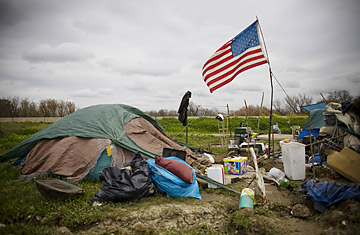
The US is facing a wave of homelessness for the first time in decades.
If the current recession is the longest since WWII and continues for another year, one of its most frightening characteristics is that the number of people whose jobless benefits run out is going to be large and will almost certainly grow substantially beginning relatively soon. This means that even though giving financial support to the unemployed may be an unbelievable expense, it may actually cost more to remove their government safety net and in some cases allow them to become indigent.
Congress agreed to extend unemployment benefits to a 59-week period last year. According to The New York Post, Wayne Vroman, an economist at the Urban Institute, estimates that up to 700,000 people could exhaust their extended benefits by the second half of this year. Since net job losses could continue well into 2010, and unemployment is likely to top 10%, the figures for people receiving no financial support at all could move well above one million before the end of the year and actually increase after that. (See pictures of the global financial crisis.)
If there is any such thing as a typical recession, it usually runs a one year cycle. By the time most people are about to run out of support from the government, the economy begins to create jobs. It is already clear that is not what will happen this year or next. (See the 25 people to blame for the financial crisis.)
The U.S. Census says that anyone under 65 making below $11.201 is below the poverty line. In 2007, nearly 13% of the population was considered impoverished — over 37 million people. Individuals who lose government support this year and next may effectively have no income at all.
The estimates of the number of homeless people in America vary widely. That may be because some surveys consider people who have no home for a night to fall into the category, while others only consider those who live in a chronic state of being without their own shelter. The disparities of measurement yield numbers that are as low at 800,000 and as high as three million.
Most people who have no income will not live in shelters or on the streets. They will move in with friends or relatives. They will only be homeless to the extent that they no long have a place of their own to live and cannot afford one. It is a form of displacement that has not been seen in America since The Depression and one which replaces the government's assistance for the individual back with the social network of the community, whether that is the community of the family or some other close knit network.
If the economic downturn is as long or longer than many pessimistic experts believe, it may well lead to a sort of widespread tribalism within the United States that has never been experienced before, at least not in anyone's memory, and that may be imperative to the government's ability to render assistance to people who have absolutely no place to live. At some point, the federal welfare system could become insolvent because of the demands of those in need. The fact that people have bonds beyond their nuclear families may be the only thing that prevents that.
— Douglas A. McIntyre
See the 25 people to blame for the financial crisis.
For constant business updates, go to 24/7wallst.com.
